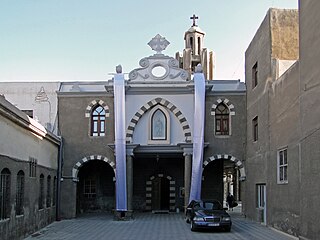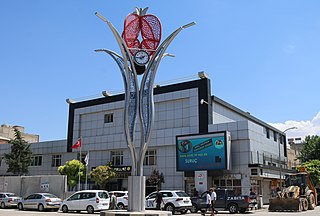
The Syriac Catholic Church is an Eastern Catholic Christian jurisdiction originating in the Levant that uses the West Syriac Rite liturgy and has many practices and rites in common with the Syriac Orthodox Church. Being one of the twenty-three Eastern Catholic Churches, the Syriac Catholic Church is a self-governed sui iuris particular church, while it is in full communion with the Holy See and with the entirety of the Catholic Church.

The Melkite Greek Catholic Church, or Melkite Byzantine Catholic Church, is an Eastern Catholic church in full communion with the Holy See as part of the worldwide Catholic Church. Its chief pastor is Patriarch Youssef Absi, headquartered at the Cathedral of Our Lady of the Dormition, Damascus, Syria. The Melkites, who are Byzantine Rite Catholics, trace their history to the early Christians of Antioch, formerly part of Syria and now in Turkey, of the 1st century AD, where Christianity was introduced by Saint Peter.

The Melkite Catholic Patriarchate of Antioch is the only actual residential Patriarchate of the Melkite Greek Catholic Church. It was formed in 1724 when a portion of the Orthodox Church of Antioch went into communion with Rome, becoming an Eastern Catholic Church, while the rest of the ancient Patriarchate continues in full communion with the rest of the Eastern Orthodox Church.

Suruç is a rural district and city of Şanlıurfa Province of Turkey, on a plain near the Syrian border 46 kilometres (29 mi) southwest of the city of Urfa.
Melkite Greek Catholic Archeparchy of Homs is a nominally Metropolitan Archeparchy of the Melkite Greek Catholic Church in central Syria. It was established on March 4, 1849 and has no suffragan, but two merged-in eparchial titles.

The Chaldean Catholic Archeparchy of Basra is a non-metropolitan Archeparchy of the Chaldean Catholic Church in southern Iraq.
The Syriac Catholic Archeparchy of Mosul is a Syriac Catholic Church ecclesiastical territory or archeparchy in northern Iraq. It is not a metropolitan see and is immediately exempt to the Syriac Catholic Patriarch of Antioch and the Roman Congregation for the Oriental Churches, and not part of any ecclesiastical province. Its cathedral is the Syriac Catholic Cathedral in the episcopal see of Mosul.
The Maronite Eparchy of Latakia or Latakia of the Maronites is a Maronite Church ecclesiastical territory or eparchy of the Catholic Church in Syria. As of 2011, there were 35,000 members. The current eparch is Antoine Chbeir.
The Armenian Catholic Archeparchy of Baghdad is a non-metropolitan Archeparchy of the Armenian Catholic Church, covering Iraq.
The Syriac Catholic Patriarchal Exarchate of Lebanon was a short-lived 20th-century jurisdiction of the Eastern Catholic Syriac Catholic Church in the Patriarch's own host country, Lebanon.
The Syriac Catholic Archeparchy of Aleppo is a Syriac Catholic Church ecclesiastical territory or archeparchy of the Catholic Church in Syria. The Archeparchy of Aleppo is not a metropolitan see and is exemption directly to the Syriac Catholic Patriarch of Antioch.
The Armenian Catholic Eparchy of Qamishli is a suffragan eparchy of the Armenian Catholic Church sui iuris in the Patriarch's own ecclesiastical province 'of Cilicia', serving part of Syria.
The Armenian Catholic Archeparchy of Aleppo (or Halab or Beroea) (informally Aleppo if the Armenians) is a non-Metropolitan Archeparchy (Eastern Catholic Archdiocese) of the Armenian Catholic Church sui iuris (Armenian Rite in Armenian language) in part of Syria.
Gabula was an ancient city and former bishopric in Roman Syria, and remains a Latin Catholic titular see.
The Syriac Catholic Eparchy of Cairo is a Syriac Catholic Church ecclesiastical territory or eparchy of the Catholic Church in Egypt. It is immediately exempt to the Syriac Catholic Patriarch of Antioch, though not part of his or any other ecclesiastical province.
The Syriac Catholic Archeparchy of Homs(-Hama-Nabk) is a nominally Metropolitan Archeparchy of the Syriac Catholic Church sui iuris in Syria. It has no suffragans. Its seat is Holy Ghost Cathedral in Homs, Syria.
Joseph Khoury was a former Archeparch of the Maronite Catholic Archeparchy of Tyre.

The Syriac Catholic Patriarchal Eparchy of Beirut is a Syriac Catholic Church ecclesiastical territory or eparchy of the Catholic Church in Lebanon. The Syriac Catholic Patriarch of Antioch's cathedra is found in the eparchy in the episcopal see of Beirut, the capital of Lebanon.
Antoine Joubeir was an Archeparch of the Maronite Catholic Archeparchy of Tripoli in Lebanon.
The Syriac Catholic Archeparchy of Baghdad is a Syriac Catholic Church ecclesiastical territory or archeparchy of the Catholic Church in Iraq. It is not a metropolitan see and is directly exempt to the Syriac Catholic Patriarch of Antioch, though not part of his or any other ecclesiastical province, and in Rome depends on the Congregation for the Oriental Churches.
This page is based on this
Wikipedia article Text is available under the
CC BY-SA 4.0 license; additional terms may apply.
Images, videos and audio are available under their respective licenses.







